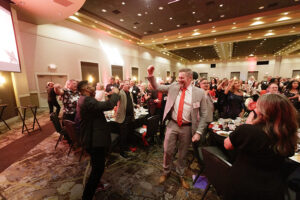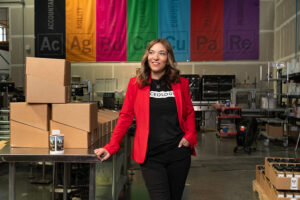Agents of Change
Over five decades of service, Eastern’s School of Social Work has never stopped improving lives and communities.
By Avery Knochel
At the beginning of the 20th century, the United States was riding an extended wave of rapid industrialization and explosive urbanization — developments that, in a sense, created the modern nation we live in today.
For millions of average Americans, however, our nation’s rise came at significant costs. Harsh working conditions, child labor, social inequities and extreme economic disparities seemed features, not flaws, in a system that championed the unchecked power of big money and those who controlled it.
Reformers of the era saw this reality as a threat to good governance and social harmony. Their response, in part, was to deploy methodologies of the newly emerging “social” sciences to create systematic, thoughtful paths toward building a more caring, equitable society. Though it didn’t yet have a name, the discipline of “social work” was born.
Fast forward to the 1970s. Thanks to the success of these early, Progressive Era reformers, along with subsequent advances associated with the New Deal and Great Society initiatives, the United States was far less unforgiving to those in need. Still, in the Pacific Northwest as elsewhere, the conditions that gave rise to the need for social work persisted: poverty, racial inequality, urban decay, limited economic mobility, and systemic barriers to success among them.

Since the late 1950s, Eastern had offered a program of study for social work students, and many of its graduates were already making a difference as professionals in both public and private sector roles. But from the start, EWU faculty members and local professionals had advocated for a school of social work, one that could serve as a home to both research faculty and graduate students. After close to seven years of lobbying, the state legislature finally gave its approval, and the school hired its first dean, John O’Neill, in 1974.
“The new school broadens our responsibility to serve the Spokane community and is a major development in our goal to provide graduate work in human and social development,” Raymond Whitfield, dean of graduate studies at the time, told The Easterner.
Fifty years later, the school is still serving the Spokane community and the wider region. That regional approach, says Kathryn DePaolis, associate professor and interim chair of the School of Social Work, was always intended to be part of the program.
“We began with a focus on interdisciplinary and rural social work practice in the curriculum,” says DePaolis. “The school was committed to serving the needs of an ‘Inland Empire’ that was comprised of small cities and towns, agriculture areas, large areas of wilderness, and a few metropolitan areas.”
Over the course of its next five decades, the school has continued to serve these areas of the region and others, both as part of its policy of providing hands-on student practicum opportunities and its success in preparing graduates to hit the ground running, says Sarah Featherly, field education director for the School of Social Work.
“There is a need for our graduates to fill the roles of case managers, navigators for those most marginalized, advocates for social justice, and agents of change,” Featherly says. And in order to become “agents of change” upon graduation, she adds, Eastern’s social work students move out of the classroom and into Greater Spokane communities to gain experience with the community members they will eventually serve.
“These opportunities provide students a chance to understand how policies, organizational structures, and resources impact individuals and communities. Through practicums, students are able to apply theoretical knowledge to real problems and see how those theories function in diverse settings,” says Featherly.
One of these former students, Geneva Prigan ’01, ’17, has applied that theoretical knowledge to a 23-year career in child welfare. It all began with an EWU practicum placement at Spokane County Head Start.
Head Start is best known as an early childhood education program. But it also provides essential child development and support services to low-income families. These include dental, vision, health screenings and growth assessments — assessments that are made available to the child’s pediatrician.
“I truly believe the MSW program at EWU provides a solid foundation for navigating [our] trauma and motivating change in the clients we serve,” says Prigan. “Having that foundation of trauma work, and looking at how trauma impacts the way that we live and the way that we heal, is probably the most impactful piece of my master’s degree.”
Just months after completing her EWU practicum work, Prigan was hired as the family service coordinator at Head Start. Her job, she says, was to do the assessments that helped her determine whether kids’ needs were being met: “In my role, I addressed any concerns I might have for a child with the family. We talked through any barriers they might have and how to better address those issues and needs.”

Her seven-year service at Head Start, Prigan says, laid the foundation for what has become a career-long focus on childrens’ wellbeing, one that has included work with the Indian Child Welfare service of the state Department of Children, Youth, and Families, or DCYF. The goal of that position, she says, was keeping Native children connected to their culture by working directly with the child’s tribe for care and services.
After 13 years on the job, Prigan then returned to EWU to complete a Master of Social Work degree. She now serves as a child welfare supervisor in the Spokane office of DCYF, where she manages a team of social workers who work to ensure a safe and smooth transition for children going into foster homes.
It’s often difficult, emotionally taxing work. “The information in some of the cases is really hard to take in and can be terrifying, quite honestly,” says Prigan. “The things that were happening to children in child welfare, and the level of trauma that these kids experienced, creates secondary trauma in the case workers and in the case work.”
Prigan credits her master’s degree program at EWU for helping her through the more difficult parts of her work, thanks in part to its emphasis on trauma-informed training.
“I truly believe the MSW program at EWU provides a solid foundation for navigating [our] trauma and motivating change in the clients we serve,” says Prigan. “Having that foundation of trauma work, and looking at how trauma impacts the way that we live and the way that we heal, is probably the most impactful piece of my master’s degree.”
What’s more, Prigan says, by helping her focus on the children and families she serves, her academic experience has helped her keep sight of the most rewarding parts of her job, like helping to reunify children and families, finding permanent adoptive homes for kids who have long been in foster care, and connecting Native children culturally with their tribes.
“As social workers, I think that we all have the ability to impact a person’s life for the better,” she says.
Making lives better, even while still a degree candidate, has long been a hallmark of EWU social work. Before students move on to create positive change professionally, they typically engage in practical, hands-on approaches to confronting challenges faced by their fellow Washington residents.
One example of this practicum work can be found at the central branch of the Spokane Public Library, where students labor alongside library professionals in assisting the unhoused population that often seeks shelter and services there. While on the job, Eagle students respond to a variety of immediate concerns, like handing out winter jackets or bottled water, and also provide guidance on mental health and housing options.
In order to better serve such students, the School of Social Work is always looking for new ways to help when needed.
Master’s degree students have also worked to address the opioid crisis, this via an interprofessional, team-based training alongside WSU students. Over the past five years, the training program is something all first-year MSW students have completed.
In order to better serve such students, the School of Social Work is always looking for new ways to help when needed. Recognizing students’ need for flexible schedules is one of those ways, and the social work program has in recent years become more accessible than ever.
“We have established part-time options in lieu of the full-time, in-person, MSW program,” says DePaolis. “The part-time programs use a hybrid format, meaning that the coursework is a combination of in-person and online instruction. The structure of the part-time programs is designed for individuals interested in social work, but their work and/or family obligations pose a barrier to obtaining a MSW degree in the traditional way.”
For students with financial challenges, scholarship opportunities, such as the one provided through Ballmer Behavioral Health, can also be a game changer. The Ballmer Scholarship covers the cost of attendance in exchange for three-years’ work at an approved behavioral-health agency in the state. Another program, the Child Welfare Training and Advancement Program, provides a similar opportunity, one in which students receive scholarship funding in exchange for two years of service at Washington’s DCYF.
Such partnerships help Eastern students overcome financial barriers while fostering relationships with often understaffed social service agencies. And the combination of such practicum and scholarship opportunities give soon-to-be Eastern grads an edge as they prepare for their careers.
To celebrate these and other successes, the School of Social Work hosted a 50th anniversary event on Oct. 12. During the celebration, held at Hargreaves Hall, EWU students, alumni and staff were able to reconnect and network as they applauded past achievements and shared insights into today’s challenges.
And what about the next 50 years? “Social work education at EWU will remain grounded in a framework of social, economic, racial, and environmental justice,” DePaolis says. “Then, as now, our job is to transform how our graduates practice, advocate, research, develop policy, and lead in diverse and global communities.”
Filed Under: Featured


